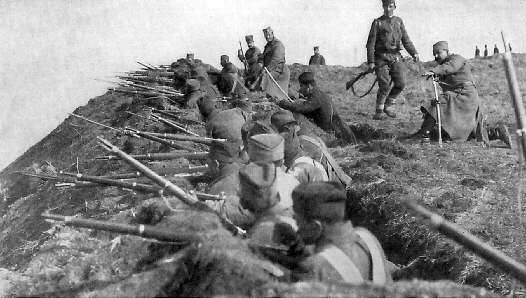Nothing but Cruelty and Suffering.
Kill them: the White Flag Be Damned.
Special to The Great War Project
(22-23 December) It keeps getting crueler and crueler.
On December 22 a century ago, Winston Churchill, the First Lord of the Admiralty, lets it be known that orders now require…
…British soldiers to bring “instant fire” to bear on German soldiers waving the white flag.
The Germans often use white flags to mask machine-gunners in the trenches.
The order comes from the Commander-and-Chief of British Expeditionary Forces Sir John French – “experience having shown that the Germans habitually and systematically abuse that emblem.”
Churchill passes along the order to British naval forces. “Any white flag hoisted by a German ship,” Churchill proclaims, “is to be fired on as a matter of principle.”
Helpless ships should be allowed to surrender, Churchill declares, “but in cases of doubt, the ship should be sunk….White flags should be fired upon with promptitude.”
In the trenches of the Western Front, “daily incidents of trench warfare could be extremely cruel.”
On the 22nd of December “two men who had been lying wounded,” reports historian Martin Gilbert, “right up against the parapet for two days, since the German counter-attack, reached their own frontline.
“Both of them had gangrene. One of them had gone mad.
But Christmas is almost upon the men in the trenches, and it is provoking feelings of mercy and good will – on both sides – completely unexpected during these few days before Christmas.
At another spot on the front-line Gilbert reports, on the 23rd of December, among those shot is a wounded piper for the British unit just engaged with the Germans. “The stretcher bearers were sent for,” reports Gilbert, “and arrived sometime before dawn. The officer refused to allow them to proceed because it was too late.
“The poor piper died of bleeding and exposure during the forenoon,” writes Gilbert, “in a trench full of water, and without anything to eat or drink, and another wounded man had to lie on his corpse.”
Elsewhere in Europe – in the Balkans — the Austrians and the Serbs are fighting their second great battle.
A few days earlier, the Austrians give up hard fought gains from earlier in December, and they flee from Serbia over tottering pontoon bridges spanning the Sava River. “Panic stricken fugitive soldiers,” reports historian Max Hastings, “struggling across, desperate to reach the Bosnian shore.”
“That day,” Hastings writes, “the Serb high command announced: ‘The enemy is beaten, dispersed, defeated and expelled from our territory once and for all.’”
The Serbs stand once again “triumphant in the battered and desolate streets of their capital,” Belgrade.
The situation for the Austrians is desperate. According to Hastings….
“Our forces literally had to march in shreds of leather and their bare feet.”
The Serbs capture 40,000 Austrian soldiers, and 130 artillery pieces. The Austrians’ infantry regiment falls apart during their retreat. There is no transport to move the most serious casualties on the Austrian side.
After the retreat, the commanding general of these forces is found unfit for combat.
Some 60,000 Austrian soldiers fall into Serb hands, and they fare equally poorly. “Disease took a heavy toll,” writes Hastings. By the end of 1914, some 12,000 Austrian POWs are dead from typhus. Of the 450,000 Austrian troops deployed to Serbia, more than 270,000 are casualties.
As for Serbia, the landscape is devastated. Many small towns are abandoned.
And Belgrade, reports Hastings, “was reduced to a city of beggars, cripples, and orphans.”



I am in fact grateful to the owner of this web site who has shared this great piece of writing at at this
time.